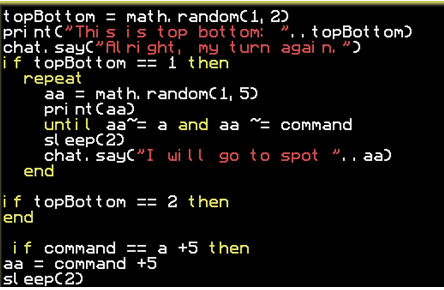A function definition would be worthwhile here:
Spoiler
local function doCommand(val)
if val == 1 then
redstone.setOutput("back", true)
elseif val == 2 then
redstone.setOutput("top", true)
elseif val == 3 then
redstone.setOutput("left",true)
elseif val == 4 then
redstone.setOutput("bottom", true)
elseif val == 5 then
rednet.send(52, "redstone5", "redstone5")
elseif val == 6 then
rednet.send(51, "redstone6", "redstone6")
elseif val == 7 then
rednet.send(53, "redstone7", "redstone7")
elseif val == 8 then
rednet.send(55, "redstone", "redstone8")
elseif val == 9 then
rednet.send(54, "redstone", "redstone9")
elseif val == 10 then
rednet.send(56, "redstone", "redstone10")
elseif val == 11 then
rednet.send(61, "redstone", "redstone11")
end
end
Say you stuck this at the top of your script. You'd then be able to replace your current lines 5-19 with "doCommand(a)", and lines 87-119 with "doCommand(aa)".
Lines 27-59 are a bit different, because (as mentioned above) "command" is a string, and the function expects a number. So in regards to converting it, we might replace line 22 with this bit of logic:
local commandNum
repeat
local player, event, command = os.pullEvent("chat")
commandNum = tonumber(command) -- tonumber() returns a number if the message represented something valid, or nil if not.
until commandNum and commandNum > 0 and commandNum < 12 -- Loop stops once commandNum is non-nil, and within our desired number range.
Lines 27-59 can then be replaced with just "doCommand(commandNum)".
So the problem is my program is supposed to have a user go to a specified spot and the computer should not be able to go the spot the user selected. So, basically in the repeat loop I'm trying to exclude values that have already been selected in a spot and the print("this is top bottom….) was to try and find if that's where the problem was(which it was). So, the point of that variable is to give a 50 percent chance of a spot on the bottom row being selected and a spot on the second row being selected.
Presumably at some point you're going to be extending things so that both the player and the computer can take more than one turn. In which case a
table would be the way to go: When the script starts, define an empty one:
local grid = {}
Then whenever a move is made, set the matching index to true:
grid[a / aa / whatever] = true
You can then perform checks to see which values have been set:
repeat
-- Ask user for move / figure out move for computer here.
until not grid[move]
Using this technique, it's important that all moves are represented as the same variable type, as grid[1] and grid["1"] won't refer to the same table index. Converting "command" using tonumber() (as demonstrated above) solves that problem.







